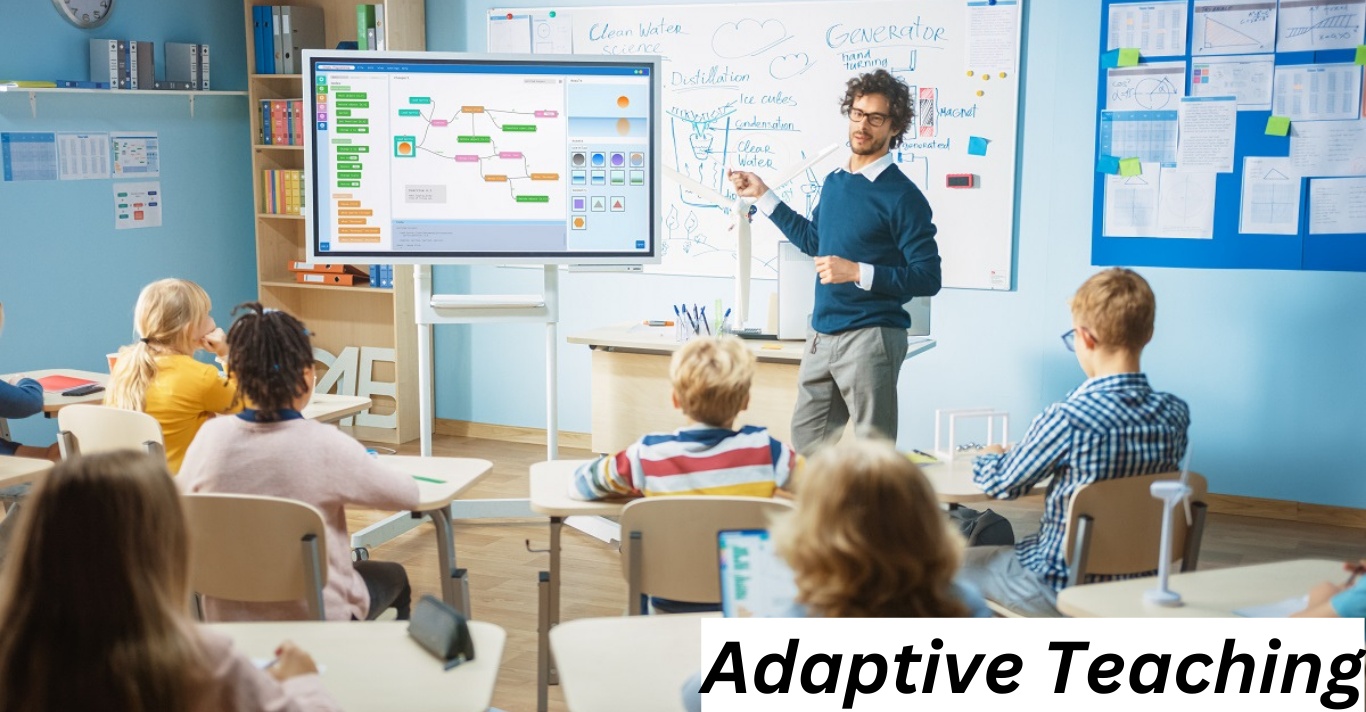The pattern of teaching is advancing day by day, as anyone who has worked in the field for more than a week will attest. Young people change with the world, and educators must adapt their expectations and instructional plans accordingly. More studies and research are conducted every year that demonstrate various methods and how every kid is a different type of learner.
Since Aristotle first proposed the idea that “each child possesses unique talents and skills,” which helped to establish the theory of learning styles, educators have strived to provide their students with the best instruction possible.
We now have a better knowledge of the needs of students than ever before because of the internet and cute small blogs like this. By customising training to each learner’s specific needs, adaptive teaching strategies promotes empowerment and engagement.
What Is Adaptive Teaching?
You probably have happened to hear about the differentiation principle at some point in teaching practice either when you were in your training college or through the staff development programmes. This involves incorporating in the study plan changes to meet the needs of learners in the learning process. It was actually founded very late, in 1999. Alternatively, differentiation is one of the teaching approaches that hold the premise that learning cannot take place in the same way for all learners.
Well, that idea has been existing for a very long time (do you recall the friend from Ancient Greece)?That is why; differentiation in the classroom may look like this or like that. Other examples are: Books can be taped; word lists or spelling lists may be followed according to the level of the students; ideas may be touchable or hear-able.
This method of presenting your curriculum to various student groups in a number of ways is comparable to, but distinct from, an approach based on Universal Design for Learning.
Adaptive teaching is a step beyond differentiation. Adaptive education is a method of teaching that meets the needs of each individual student as well as the needs of the class as a whole.
The Advantages Of Adaptive Teaching
Adaptive teaching is a methodology that customises training to each learner’s specific needs. With the online exam help of this approach, students may take charge of their education, find their passions, and realise their full potential in a motivating and encouraging environment.
- PISA define strategies for student achievement, and it has revealed that the strategy known as “Adaptive instruction” has the strongest positive correlation with student achievement.
- Professors can also find out what their students require, and helps everyone within the class to succeed.
- The methods of adaptive learning assist students in leading their educational processes and achieving their study goals as, in contrast to traditional learning, this approach provides learners with complex and individualised learning approaches that allow them to master all the topics.
- Inclusive teaching strategies also complement the development of teachers and give them more guidance on how to increase the achievement of learners with congenital difficulties by carrying out classes that are adapted to individual learning styles.
The Effective Adaptive Teaching Strategies
Here are some ways through which you can facilitate adaptive teaching in a classroom:
- Flexible seating:
It is a great concept that allows students to have a voice on where they are able to study and which area to occupy in the classroom. This way, online coursework help learners find the appropriate position or a comfortable and efficient sitting position like a standing desk, bean bag, or a stability ball.
- Gamification:
This method implies the integration of the game elements such as the use of the leaderboards, points, and badges into the educational process. Educators can encourage children to remain active and diligent learners and get the desired results while enjoying themselves.
- Collaborative Education:
With this method, students are encouraged to collaborate in small groups to solve issues and finish assignments. In addition to critical thinking and communication abilities, teachers can assist students in developing key collaboration skills by creating a collaborative and supportive learning environment. Working and exchanging ideas with classmates is also a lot of fun.
The Challenges You Might Face In Adaptive Learning\
Adaptive teaching tactics, like any comprehensive teaching strategy, necessitate a thorough grasp of both the needs of each individual student and the class as a whole. Making the decision to introduce adaptive teaching into your classroom will be aided by a comprehensive formative assessment.
This method is only effective if you complete your assignments and ensure that your instruction is effective and flexible. Depending on the size of your class, the number of distinct student groups you are in charge of, and the potential disabilities of some of your students, this can be challenging.
To determine whether ideas like adaptive education can be implemented widely, mainstream schools are gradually introducing them; one step towards making this a reality is the efficient employment of teaching assistants.
While having high standards for yourself and the training you choose is always a good thing, keep in mind that teaching is not an easy task. Consult with your supervisors and students to determine the most effective approach for your particular learning environment.
Why Adaptive Teaching Is So Significant?
In order to guarantee that every learner receives the greatest results, adaptive teaching is essential. Adaptive instruction:
- Contributes to the development of a more welcoming classroom environment where every child’s needs are met.
- Aids educators in determining students’ past knowledge of the material, enabling them to make more efficient plans.
- Aids educators in recognising and preparing for potential obstacles to learning. For instance, a particular SEND, such as communication needs, needs related to social, emotional, and mental health, etc.
- Allows educators to give every child fair access to learning opportunities.
- Better academic results for students will come from being adaptive in the present as well as as a result of thoughtful, planned adaptive teaching tactics.
- Ensures that no child is left behind by offering them the opportunity to succeed. This may lessen the differences in learning and growth between students.
- Ensures that students are motivated and involved in their study by fostering a higher regard and admiration for education. Here is more information about the significance of motivation in learning.
Supports educators as well as students. Teachers who have thoughtfully and thoroughly planned will feel more secure in their delivery since they have taken into account any obstacles that students might encounter. This allows educators more control over the course of a class and provides them with the flexibility and room to develop their own on-the-spot adaptive teaching techniques. Teachers’ long-term professional satisfaction may rise as a result of this.




